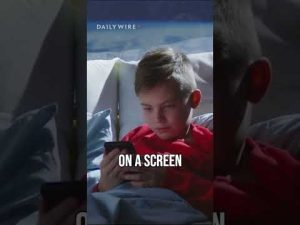In a world where children are increasingly glued to screens and social media, it’s refreshing to finally see some common sense prevail in Virginia. Governor Glenn Youngkin has taken a bold step by signing a new law that limits social media use for minors under 16 to just one hour per day. Now, doesn’t that sound like something that was just long overdue? The support for this law speaks volumes about the pressing need to address the digital addiction that’s gripping our young ones. And, let’s be honest, when was the last time you saw a Democrat and a Republican agree on anything?
The very idea that children spend anywhere from three to nine hours a day staring at screens sends shivers down the spine. And yet, some folks are quick to jump to their feet, waving flags about government overreach and freedom. It’s almost comical to think that controlling screen time is seen as a step toward totalitarianism. What, are we supposed to believe that limiting little Timmy’s Snapchat binge is going to plunge us all into a police state?
Let’s take a moment to look at the facts. These multi-billion dollar companies have carefully crafted platforms designed to get everyone, especially the impressionable young, hooked. Children are not just glued to the glowing screens; they’re getting affected emotionally and mentally as well. Anxiety, depression, and a slew of other issues are on the rise, thanks in no small part to relentless scrolling and social validation-seeking. Common sense — and studies aplenty — can tell you that these habits don’t result in well-adjusted adults.
Critics argue, with almost staggering predictability, that this is the realm of parental responsibility. Government? They say, leave it at the door. But here’s the thing: if parents universally did their jobs, would we even need laws? Laws exist because parents, like everyone else, falter. It’s not about invading the sanctity of parenting but about providing a safety net for children whose guardians might not grasp the full gravity of digital dangers. Using the same flawed logic as the critics, we wouldn’t need drunk driving laws either — because, you know, people should just choose not to drink and drive.
Some might argue this sets a dangerous precedent, a slippery slope into a world where the government makes every decision for us. But alarmists love bringing up slippery slopes without acknowledging the nightmares we could have if there weren’t checks in place. Imagine a world where kids connect more with virtual friends than real ones, where they know the latest trends but not the joy of playing outside. If this law means kids spend more time in reality, learning and growing like children should, then here’s hoping we slide right into that “dystopia.”
The bottom line is this: if you’re a responsible parent, this law won’t change much in your household. In fact, it will ensure that others follow suit, helping to create a healthier society for all our children. Parents who rely on legislation to stop their kids from digital addictions should take it as a wake-up call. It’s high time we stop viewing every protective measure as an infringement on freedom and start considering it a bare minimum standard — for the sake of kids who deserve better from all of us.







